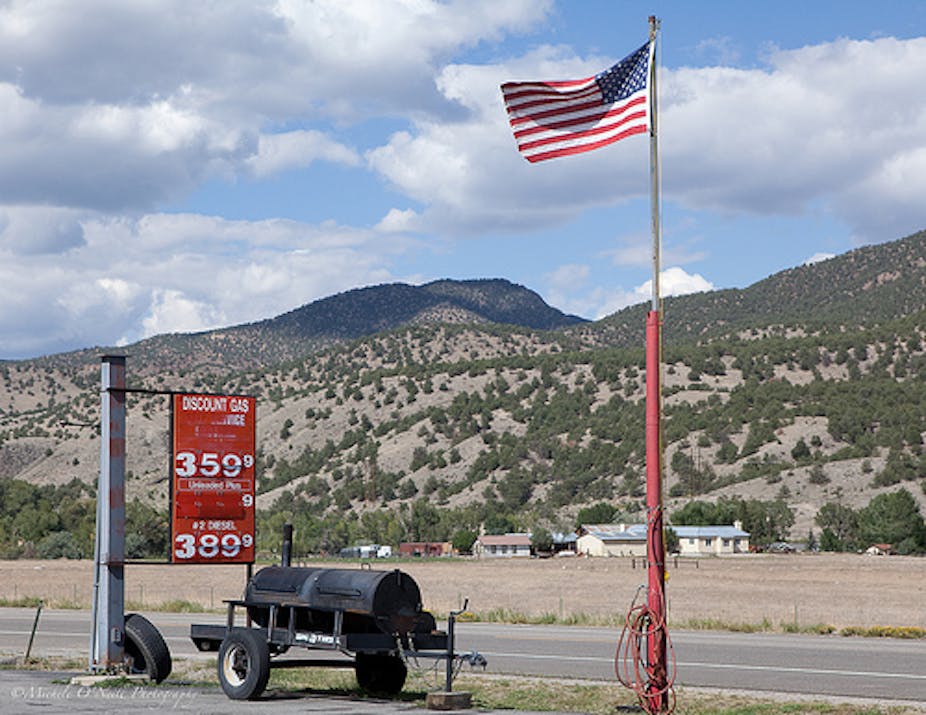That Republican presidential nominee Mitt Romney is locked into such an unalloyed pro-oil stance is not so surprising, given the alignment of the core Republican states with oil producers’ interests.
However, in terms of Electoral College votes, influence rests with a relatively few “swing states”. Here, money counts.
The electoral laws allow very large private injections of campaign funds, provided this is done indirectly through PACs. The Koch brothers own the largest independent oil companies in the US They stand to gain from Romney’s policies, and their anti-Obama campaign expenses have been estimated at over $400 million.
As regards some of these important swing states such a broad pro-oil strategy also has its risks. Obama has been caught between a strategy of scape-goating “Big Oil” for oil price rises and eliminating its tax breaks, and one of partially meeting its demands. But so far, access has been denied to oil offshore of Virginia, Florida (both key swing states) or California, a core Democrat state.
The debate on climate change: killed by oil interests and Tea Party extremists
Climate science tells us that dangerous prospective climate tipping points are even more evident than was apparent in 2007.
Yet climate change and the environment featured hardly at all in the two Presidential debates. By contrast, in the 2008 presidential election both Obama and his Republican rival McCain shared a commitment to reducing emissions via a cap-and-trade scheme. The Waxman-Markey Bill that proposed this scheme, however, passed the House of Representatives in 2009 but died in the Senate.
Since then, US climate policy has suffered a radical reversal. These changed political circumstances led Obama to abandon emission pricing. The Republican side has been dragged to the right by the Tea Party phenomenon, for whom climate “denialism” is a defining feature. In the ranks of oil, ExxonMobil firmly denies the need for abatement action, as do the Koch brothers (whose funding nonetheless went awry on at least one occasion).
As it happens, US energy sector emissions of CO2 are currently at their lowest level since the early 1990s. This is for a variety of reasons: increased gas-fired electricity generation at the expense of older coal-fired generating plant, de-industrialisation (“off-shoring”) and the economic downturn since 2008. Also relevant has been Obama’s continued pursuit of CO2 abatement by other means: for example, through tightened and accelerated vehicle efficiency standards together with the tax breaks to rapidly expanding wind-power.
Non-conventional petroleum and environmental impacts
The non-conventional petroleum “revolution” has several elements: import of Canadian tar sands and rapid expansion of accessible shale gas and “tight oil” reserves, and deep ocean drilling. In the absence of effective regulation, these are all problematic on environmental and safety grounds.
Tar sands is a highly CO2-intensive (also, natural gas-intensive and water-intensive) input to oil refining. Under pressure on environmental grounds, Obama deferred approval of its transfer (via the Keystone pipeline) to Texas refineries. It was provisionally rejected “in the national interest” in January 2012: the main cited problem being “the uniquely sensitive terrain” of the Sand Hills in Nebraska and an associated aquifer. Pending additional information, further State Department advice has been “conveniently” deferred ─ but only until early 2013. Romney has committed to approving this pipeline project in his first day in office, to the pecuniary benefit of his principal energy policy adviser, one Harold Hamm.

Natural gas from shale is both an input to electricity generation and a potential substitute for oil in transport uses, but is subject to concerns about the effect of fracking (hydraulic fracturing) on water resources, and potential fugitive emissions of methane, a potent greenhouse gas.
While there are reservations about Obama’s regulatory policies, he has committed to retaining the federal government’s regulatory role in environmental protection. Even if Obama is returned, adequate protections will no doubt require grassroots political struggle. Such citizen action will be more difficult to sustain if Romney is successful and regulatory powers are decentralised to the state level alone.
A sustainable energy policy could address the US economic train-wreck
Obama is politically vulnerable on the stagnated economy. Because of the accumulated government debt, the deficit has long-term as well as short term dimensions. The political reality is that an issue such as approval of the Keystone tar sands pipeline is framed electorally by Republicans as about “jobs”.
Dealing with a deep and prolonged economic recession requires significantly increased investment, preferably in productive and revenue-earning assets. This investment is not sufficiently forthcoming from the private sector in part because of depressed business and consumer confidence.
Big business believes this “confidence” can be restored only by major government concessions to businesses and the wealthy. Given this sector’s (ideological) rejection of deficit spending, this requires savage cuts to other sectors, especially targeting Romney’s “47%”.
A more viable policy strategy would include public investment in efficient reconstruction and long overdue maintenance of decaying infrastructure across the country, cognisant of environmental constraints and imperatives. Government budget constraint must also be met by funding these expenditures from user charges and taxes specifically on those sectors benefiting from such expenditure.
The cost-effective reduction of CO2 emissions fits into this “alternative” framework. A green investment strategy would draw on the US’s advantage in research and development. It would encompass cost-effective (and often more skilled job-intensive) investment in low-carbon and energy-efficient assets, including locally manufactured exportable vehicles and energy efficient structures.
It could also include conventional and non-conventional fossil fuels that pass stringent environmental tests, with development of genuine clean natural gas and clean coal technologies like CO2 capture and storage (CCS). These can only occur with strong regulation and commitment to averting catastrophic climate change, especially through the pricing of emissions.
It is not too late for Obama to inject such a narrative into the current Presidential debates. Or maybe economist Jeffrey Sachs has it right when he says “Big Oil owns the Republicans and Wall Street owns the Democrats”.

